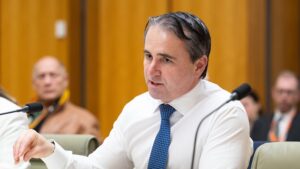
The ongoing IT crisis at Wellington Regional Hospital has forced clinicians to operate under severe constraints, with malfunctioning systems significantly delaying patient care. This situation has arisen following cuts to specialist technical staff, raising concerns over the consequences of these reductions.
According to Fleur Fitzsimons, National Secretary for the Public Service Association Te Pūkenga Here Tikanga Mahi, warnings were issued to the government last year about the risks involved in reducing IT personnel at Health NZ Te Whatu Ora. “We warned the Government that cutting IT staff was playing with fire. Now we’re seeing the inevitable result – doctors forced to make decisions without access to critical patient information,” Fitzsimons stated.
The repercussions of these staff reductions extend beyond Wellington, with similar issues affecting clinicians across the health system. Fitzsimons emphasized that the Public Service Association (PSA) has gathered evidence indicating that the IT Help Desk at Health NZ is severely understaffed. This has led to reliance on contractors to address deficiencies, yet the staffing levels remain inadequate, causing significant delays in resolving technical problems.
Wellington Hospital’s single clinical portal has been experiencing persistent issues since March 2023, according to a report from The Post. Clinicians have reported that the system is operating at a painfully slow pace and frequently crashes, rendering access to essential medical records, such as X-rays and scans, nearly impossible. In many instances, medical staff have resorted to ordering tests on paper due to the failures of the digital systems.
“This is what happens when you gut the very teams that keep essential systems running,” Fitzsimons noted, underscoring the critical nature of the situation. “Patient safety is on the line. Sensitive patient records are at risk. The stakes could not be higher.”
The PSA had previously requested an investigation into privacy risks to patient data from the Privacy Commissioner, who declined the request. Fitzsimons urged the commissioner to reconsider this decision, highlighting the potential harm to patients and the compromise of confidential health information.
In response to the crisis, Health Minister Simeon Brown has attributed the issues to health reforms initiated by the previous government. Fitzsimons dismissed this explanation as a distraction, stating, “You can’t slash IT staff and then act surprised when the systems fail.”
The current government is under pressure to address the situation effectively. Fitzsimons called for a comprehensive approach that includes adequately resourcing Health NZ’s IT workforce, upgrading outdated systems, and ensuring that hospitals receive the necessary technical support around the clock.
“Our health workers deserve better. And so do the patients who depend on them,” she concluded, urging immediate action to resolve the crisis and safeguard patient care in Wellington and beyond.
As the situation unfolds, it remains crucial for government officials to prioritize the health sector’s technological infrastructure to prevent further disruptions and protect public health.







